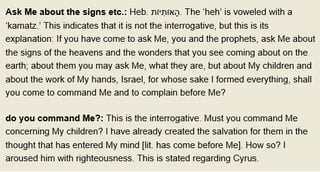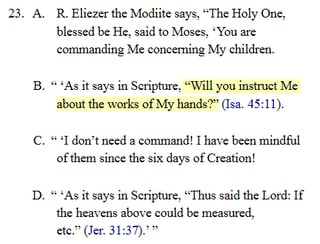The medieval scholar, Rabbi Shlomo Yitzchaki (“Rashi”) commented on this verse and noted the following. Please click in the text citation box below in order to view the source online at http://www.chabad.org

In this regard, Rashi would have had access to the relevant Targum, which had already existed eight centuries before Rashi. That is, the Targum provides insights as to how rabbinic scholars had understood the verse in earlier centuries prior to Rashi. The following comes from the Targum Jonathan to the Prophets, which had appeared as early as the Second Century.

The proposed translation of this Targum is as follows:
Thus says the Lord, the Holy One of Israel, even that I shall restore Israel for future events to come. Ask (masc., plural) before me! Concerning my people --even the work of my mighty power-- will you (masc., plural) instruct me?
The last portion of this verse in the Targum is a question, which is in keeping with the observations of Rashi and with the Mekhilta de-Rabbi Shimon bar Yohai.
The Mekhilta de-Rabbi Shimon bar Yohai is a collection of classical halakhic midrashic interpretation of the biblical Book of Exodus, and in this regard this resource is an indispensable source for understanding the history, beliefs, and practices of the earliest rabbis. The majority of the traditions preserved stem from the tannaitic period of early Rabbinic Judaism (approximately 70–200 C.E.), although a portion of its material dates to the beginning of the subsequent amoraic period (approximately 200–500 C.E.). The following citation (from Tractate Beshallạ, 23:1:23.B) contains a direct reference to Isaiah 45:11.

The rabbis had understood the citation of the verse in Isaiah as a rhetorical question by the Lord.
Finally, the second person verbs of Isaiah 45:11 are in the masculine plural, and so the readers are in view (and not Cyrus, who appears in verse 1 of the chapter). This arrangement of clauses and translation by the Targum in addition to the Mekhilta de-Rabbi Shimon bar Yohai all follow the syntactical structure of the verse in Hebrew as was later established by Masoretic scholars in the 9th and 10th Centuries.

Please note that the red box indicates that the last six words (ignoring the Maqqēphim of course) appear to fall into one logical grouping, which means that the very last word of the verse (the verb) takes as its object the preceding five words. Thus the proposed translation into English would appear as follows consistent with the Jewish sources already noted, above.
Thus says the Holy One of Israel, even his Creator. Ask (masc., plural) me concerning coming things! Concerning my sons --even the works of my hands-- will you (masc., plural) be instructing me?
In conclusion, the verbs in verse 11 are in the second person plural, and refer to the readers, who, as Rashi indicated, also included the prophets at the time of writing then.
In other words, the gist of the verse is as follows: The Lord is calling on the readers to discover his divine plan for the promised future of the Jewish peoples, whom he created.
Reference:
Nelson, W. David. (2006). Mekhilta de-Rabbi Shimon bar Yohai. Philadelphia: Jewish Publication Society, 102-103.



